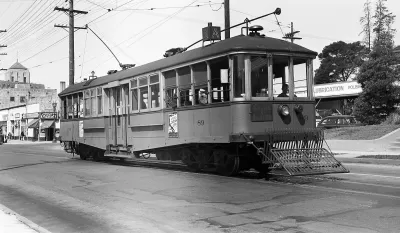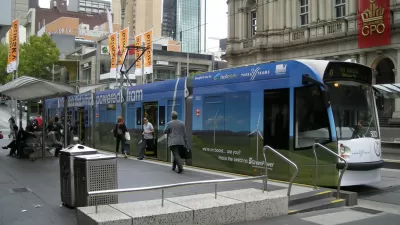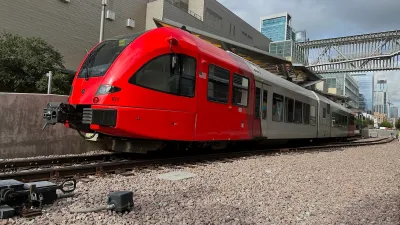The Union of Concerned Scientists takes us on a “trip down memory ‘train,’” examining the history of public transit, including its chronic disinvestment and perpetuation of racism, from the 1800s to today.

The Union of Concerned Scientists (UCS) recently published a brief, informative history of public transit in the U.S. that examines how, despite the fact that being able to get from place to place is “the foundation for a thriving community and sets the stage for growing our economy and upward mobility,” our current transportation system falls short and leaves many of us disconnected. Despite the success of privately run streetcar systems in the 1800s and early 1900s, “city, state, and federal politicians, along with private sector interests made intentional decisions that locked in car-dependent infrastructure,” writes Kevin X. Shen, Northeast transportation policy analyst and advocate with the UCS. Despite the federal government passing the Urban Mass Transportation Act of 1964, transit has been historically underfunded.
Shen’s article outlines the racist underpinnings of both early transit and how the prioritizing of car infrastructure and construction of the interstate highway system perpetuated racial inequality and injustices, as well as the decades of ongoing debate in Congress over whether the federal government should be funding local transit at all rather than focusing on highways. He concludes with a summary of where this history has gotten us — “With decades of low commitment to transit and instead investing in car dependence, transportation is now the largest sector of US greenhouse gas emissions, is the second largest household expenditure, and remains a key factor perpetuating inequities in our country” — and looks to what our next chapter could hold.
FULL STORY: A Trip Down Memory “Train”: A Brief History of Public Transit

Alabama: Trump Terminates Settlements for Black Communities Harmed By Raw Sewage
Trump deemed the landmark civil rights agreement “illegal DEI and environmental justice policy.”

Study: Maui’s Plan to Convert Vacation Rentals to Long-Term Housing Could Cause Nearly $1 Billion Economic Loss
The plan would reduce visitor accommodation by 25% resulting in 1,900 jobs lost.

Planetizen Federal Action Tracker
A weekly monitor of how Trump’s orders and actions are impacting planners and planning in America.

Waymo Gets Permission to Map SF’s Market Street
If allowed to operate on the traffic-restricted street, Waymo’s autonomous taxis would have a leg up over ride-hailing competitors — and counter the city’s efforts to grow bike and pedestrian on the thoroughfare.

Parklet Symposium Highlights the Success of Shared Spaces
Parklets got a boost during the Covid-19 pandemic, when the concept was translated to outdoor dining programs that offered restaurants a lifeline during the shutdown.

Federal Homelessness Agency Places Entire Staff on Leave
The U.S. Interagency Council on Homelessness is the only federal agency dedicated to preventing and ending homelessness.
Urban Design for Planners 1: Software Tools
This six-course series explores essential urban design concepts using open source software and equips planners with the tools they need to participate fully in the urban design process.
Planning for Universal Design
Learn the tools for implementing Universal Design in planning regulations.
Caltrans
Smith Gee Studio
Institute for Housing and Urban Development Studies (IHS)
City of Grandview
Harvard GSD Executive Education
Toledo-Lucas County Plan Commissions
Salt Lake City
NYU Wagner Graduate School of Public Service





























